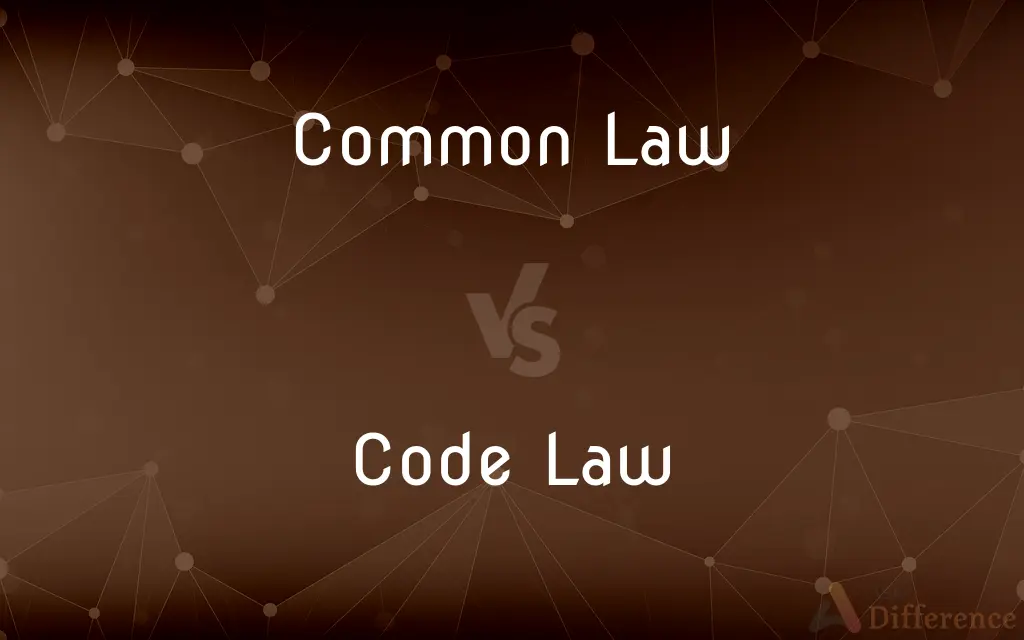Common Law vs. Code Law — What's the Difference?
Edited by Tayyaba Rehman — By Fiza Rafique — Published on November 14, 2023
Common Law is based on judicial decisions and precedents, while Code Law relies on detailed written legal codes.

Difference Between Common Law and Code Law
Table of Contents
ADVERTISEMENT
Key Differences
Common Law and Code Law provide frameworks for legal systems worldwide, but they follow different principles and methodologies. Common Law, predominant in countries like the UK and US, is deeply rooted in judicial decisions, also known as case law or precedent. When a judge makes a decision in a case, that decision becomes a precedent for future cases of a similar nature. Conversely, Code Law, found in nations like France and Germany, centers around a comprehensive written set of legal codes that dictate how legal issues should be addressed.
Though Common Law evolves with the changing societal values and interpretations of older precedents, it highly values stability and consistency. When a decision is made, subsequent decisions try to adhere to that precedent, ensuring predictability. In contrast, Code Law seeks clarity and exhaustiveness, aiming to address all conceivable legal situations in its codes. This means that judges in Code Law systems have a more restrictive role, often limited to interpreting and applying the written law.
Another distinction is the manner in which the laws are developed and modified. Common Law is dynamic, constantly shaped by judicial interpretations and rulings. If societal values shift or new situations emerge, the law can adapt accordingly. Code Law, however, is typically modified through legislative processes. If changes are deemed necessary, the legal code itself is amended.
In essence, while both Common Law and Code Law aim to provide justice and order in society, they differ in their foundational principles, development methods, and application. Their existence showcases the diverse approaches to legal systems around the world.
Comparison Chart
Basis
Judicial decisions and precedents
Detailed written legal codes
ADVERTISEMENT
Development
Evolves through judicial interpretations
Amended through legislative processes
Judge's Role
Interpret and set precedents
Interpret and apply the written law
Adaptability
Dynamic and can adapt to societal shifts
Requires legislative amendment for significant changes
Predominant Countries
UK, US
France, Germany
Compare with Definitions
Common Law
Offers flexibility to adapt to changing societal values.
Common Law can shift over time to reflect current societal standards.
Code Law
Primarily modified through legislative processes.
Changes in Code Law typically require legislative action.
Common Law
A legal system based on judicial decisions.
In Common Law countries, judges often refer to past rulings for guidance.
Code Law
Common in many European and Latin countries.
France's legal system is a prime example of Code Law.
Common Law
Relies on precedents set by earlier court decisions.
Common Law evolves as new decisions are made and old ones are interpreted.
Code Law
A legal system based on a comprehensive written set of rules.
In Code Law systems, judges refer to established legal codes for decision-making.
Common Law
Provides consistency through established case law.
Businesses in Common Law jurisdictions appreciate the predictability it offers.
Code Law
Emphasizes clarity and detailed enumeration of laws.
Code Law aims to address all potential legal scenarios in writing.
Common Law
Is a cornerstone of legal systems in many English-speaking countries.
The US, with its foundation in Common Law, often looks to previous case decisions.
Code Law
Provides clear-cut guidelines for legal issues.
Lawyers in Code Law countries often cite specific codes in their arguments.
Common Law
Of, relating to, or based on common law.
Common Law
Of or relating to a common-law marriage.
Common Law
Of or pertaining to common law.
Common Law
Relating to common-law marriage.
Common Law
Based on common law;
A common-law right
Common Curiosities
Can Common Law evolve over time?
Yes, Common Law evolves through judicial decisions and societal changes.
How are changes made in Code Law systems?
Changes in Code Law are typically made through legislative processes.
Are judges in Code Law systems restricted in their decision-making?
Yes, judges in Code Law systems primarily interpret and apply the written code.
What's the main source of law in Code Law systems?
Code Law systems rely on comprehensive written legal codes.
Does Common Law have written statutes?
Yes, while Common Law relies on precedents, written statutes also exist and are used.
How does Code Law address unforeseen legal situations?
Code Law aims to be exhaustive, but unforeseen situations would require legislative amendments.
Which system offers more predictability, Common Law or Code Law?
Both offer predictability, but in different ways—Common Law through precedents and Code Law through clear codes.
Can a country combine elements of both systems?
Yes, some countries blend elements of both Common Law and Code Law.
Are human rights treated differently in the two systems?
The treatment of human rights depends on individual countries, not solely on the legal system.
Which countries primarily follow Common Law?
Countries like the UK and US predominantly follow Common Law.
Which system relies more on judicial interpretation, Common Law or Code Law?
Common Law relies more on judicial interpretation and setting precedents.
Do both systems have roots in ancient legal traditions?
Yes, both have historical roots—Common Law in medieval England and Code Law in Roman law.
How does legal education differ between the two systems?
Common Law training often involves case analysis, while Code Law education focuses on code interpretation.
Which system is older, Common Law or Code Law?
Both have ancient origins, but Code Law's roots in Roman law make it historically older.
What's the role of juries in Common Law vs. Code Law?
Juries play a significant role in many Common Law systems, while their role in Code Law systems varies by country.
Share Your Discovery

Previous Comparison
Memory Jogger vs. Reminder
Next Comparison
Rubber Wood vs. MDF WoodAuthor Spotlight
Written by
Fiza RafiqueFiza Rafique is a skilled content writer at AskDifference.com, where she meticulously refines and enhances written pieces. Drawing from her vast editorial expertise, Fiza ensures clarity, accuracy, and precision in every article. Passionate about language, she continually seeks to elevate the quality of content for readers worldwide.
Edited by
Tayyaba RehmanTayyaba Rehman is a distinguished writer, currently serving as a primary contributor to askdifference.com. As a researcher in semantics and etymology, Tayyaba's passion for the complexity of languages and their distinctions has found a perfect home on the platform. Tayyaba delves into the intricacies of language, distinguishing between commonly confused words and phrases, thereby providing clarity for readers worldwide.












































